#I feel we have to counter the narrative at every point
Text
Why increasing public sector wages won’t cause inflation.
One of the current Tory arguments about wages is that if they increase public sector wages, inflation will go up. Even by their own logic, this is clear nonsense, and there’s a reasonably strong argument that increasing public sector wages could actually stimulate the economy too.
So, where does this idea come from? Well, it comes from business, where the idea is that if you increase wages, some or all of that price rise gets passed on to the consumer, and prices go up. Of course, even this is false, because in many cases the consumer will say “fuck that” and not buy the product, or choose a cheaper alternative. Thus, the company must instead reduce profits to retain consumers (and let’s not be fooled, a lot of companies are still making huge, untaxed profits right now). Or they cut hours and provide a less good service.
But this doesn’t apply in the public sector. Increasing wages of people in education, or in healthcare or in the civil service etc has no direct impact on the price of anything, because the public don’t directly buy our services.
However, it may actually stimulate the economy more widely.
In general, when you give rich people more money, they save it, or possibly “invest it”- meaning it basically goes out of circulation and doesn’t further benefit anyone.
If you give people right at the bottom more money, then they almost inevitably spend it right away, usually on essentials- which benefits the economy because more money is being spent, so companies have more money to pay wages, etc etc. But this doesn’t work soooo well, because people always need essentials, and will find some way of getting them, generally, if they possibly can. Of course, we want a world where everyone has access to these essentials easily, but we’re trying to think like an economist right now.
Most public sector workers are somewhere between these two extremes although some are definitely in the second category.
Right now, however a lot of people like teachers, nurses, junior doctors, junior civil servants etc etc are “feeling the squeeze”- caught between high housing prices, rising bills and stagnating wages, there’s less and less money to spend on “luxuries”. People might cut back on eating out, on take aways, on buying new clothes, on buying presents, on “treats”, on non-essential travel, on buying things like books and nice stationery, on make up and toiletries, on haircuts and getting their nails done- the list goes on.
These things aren’t essential to survival, you can do without them. So if you can’t afford to buy them, you don’t. But of course, if a lot of people stop buying these things at once, it hurts the economy. Companies that make or sell these things see profits go down, perhaps reduce hours or lay off staff, which in turn gives them less money to spend, and it all becomes a vicious cycle which shrinks your economy- i.e. the worst possible thing if you’re a Tory, supposedly.
(Investing in education and health also has long term pay off, but anyway).
If the people at the bottom and the people a bit above the bottom had a bit more spare cash, there would be more spending, and more businesses would see a proportion of that spending. And so they can offer staff more hours, pay higher wages, employ more staff. There’s more money going around and it’s a virtuous circle. The economy grows.
Would some companies then put their prices up? Maybe. Companies will often raise prices whenever they can. But the pressure to increase prices tends to come from increased costs, not increased custom. And it would matter less because everyone or nearly everyone would be earning more.
Cutting and cutting just leaves everyone poorer. We know this.
So why do the Tories keep going on TV and spouting bollocks? It might be because they don’t actually understand the economics of the situation (scarily likely) but it’s also likely to be ideological. They’d rather “win” the fight with the unions than do something that could actually help everyone.
#uk politics#cost of living crisis#economics#tories#public sector pay#wage stagnation#squeezed middle#capitalism#like#this might be the most capitalist thing I have ever written#but#I feel we have to counter the narrative at every point
334 notes
·
View notes
Text
A pro-Palestine Jew on tiktok asked those of us who were raised pro-Israel, what got us to change our minds on Palestine. I made a video to answer (with my voice, not my face), and a few people watched it and found some value in it. I'm putting this here too. I communicate through text better than voice.
So I feel repetitive for saying this at this point, but I grew up in the West Bank settlements. I wrote this post to give an example of the extent to which Palestinians are dehumanized there.
Where I live now, I meet Palestinians in day to day life. Israeli Arab citizens living their lives. In the West Bank, it was nothing like that. Over there, I only saw them through the electric fence, and the hostility between us and Palestinians was tangible.
When you're a child being brought into the situation, you don't experience the context, you don't experience the history, you don't know why they're hostile to you. You just feel "these people hate me, they don't want me to exist." And that bubble was my reality. So when I was taught in school that everything we did was in self defense, that our military is special and uniquely ethical because it's the only defensive military in the world - that made sense to me. It slotted neatly into the reality I knew.
One of the first things to burst the bubble for me was when I spoke to an old Israeli man and he was talking about his trauma from battle. I don't remember what he said, but it hit me wrong. It conflicted with the history as I understood it. So I was a bit desperate to make it make sense again, and I said, "But everything we did was in self defense, right?"
He kinda looked at me, couldn't understand at all why I was upset, and he went, "We destroyed whole villages. Of course we did. It was war, that's what you do."
And that casual "of course" stuck with me. I had to look into it more.
I couldn't look at more accurate history, and not at accounts by Palestinians, I was too primed against these sources to trust them. The community I grew up in had an anti-intellectual element to it where scholars weren't trusted about things like this.
So what really solidified this for me, was seeing Palestinian culture.
Because part of the story that Israel tells us to justify everything, is that Palestinians are not a distinct group of people, they're just Arabs. They belong to the nations around us. They insist on being here because they want to deny us a homeland. The Palestinian identity exists to hurt us. This, because the idea of displacing them and taking over their lands doesn't sound like stealing, if this was never theirs and they're only pretending because they want to deprive us.
But then foods, dances, clothing, embroidery, the Palestinian dialect. These things are history. They don't pop into existence just because you hate Jews and they're trying to move here. How gorgeous is the Palestinian thobe? How stunning is tatreez in general? And when I saw specific patterns belonging to different regions of Palestine?
All of these painted for me a rich shared life of a group of people, and countered the narrative that the Palestininian identity was fabricated to hurt us. It taught me that, whatever we call them, whatever they call themselves, they have a history in this land, they have a right to it, they have a connection to it that we can't override with our own.
I started having conversations with leftist friends. Confronting the fact that the borders of the occupied territories are arbitrary and every Israeli city was taken from them. In one of those conversations, I was encouraged to rethink how I imagine peace.
This also goes back to schooling. Because they drilled into us, we're the ones who want peace, they're the ones who keep fighting, they're just so dedicated to death and killing and they won't leave us alone.
In high school, we had a stadium event with a speaker who was telling us about a person who defected from Hamas, converted to Christianity and became a Shin Bet agent. Pretty sure you can read this in the book "Son of Hamas." A lot of my friends read the book, I didn't read it, I only know what I was told in that lecture. I guess they couldn't risk us missing out on the indoctrination if we chose not to read it.
One of the things they told us was how he thought, we've been fighting with them for so long, Israelis must have a culture around the glorification of violence. And he looked for that in music. He looked for songs about war. And for a while he just couldn't find any, but when he did, he translated it more fully, and he found out the song was about an end to wars. And this, according to the story as I was told it, was one of the things that convinced him. If you know know the current trending Israeli "war anthem," you know this flimsy reasoning doesn't work.
Back then, my friend encouraged me to think more critically about how we as Israelis envision peace, as the absence of resistance. And how self-centered it is. They can be suffering under our occupation, but as long as it doesn't reach us, that's called peace. So of course we want it and they don't.
Unless we're willing to work to change the situation entirely, our calls for peace are just "please stop fighting back against the harm we cause you."
In this video, Shlomo Yitzchak shares how he changed his mind. His story is much more interesting than mine, and he's much more eloquent telling it. He mentions how he was taught to fear Palestinians. An automatic thought, "If I go with you, you'll kill me." I was taught this too. I was taught that, if I'm in a taxi, I should be looking at the driver's name. And if that name is Arab, I should watch the road and the route he's taking, to be prepared in case he wants to take me somewhere to kill me. Just a random person trying to work. For years it stayed a habit, I'd automatically look at the driver's name. Even after knowing that I want to align myself with liberation, justice, and equality. It was a process of unlearning.
On October, not long after the current escalation of violence, I had to take a taxi again. A Jewish driver stopped and told me he'll take me, "so an Arab doesn't get you." Israeli Jews are so comfortable saying things like this to each other. My neighbors discussed a Palestinian employee, with one saying "We should tell him not to come anymore, that we want to hire a Jew." The second answered, "No, he'll say it's discrimination," like it would be so ridiculous of him. And the first just shrugged, "So we don't have to tell him why." They didn't go through with it, but they were so casual about this conversation.
In the Torah, we're told to treat those who are foreign to us well, because we know what it's like to be the foreigner. Fighting back against oppression is the natural human thing to do. We know it because we lived it. And as soon as I looked at things from this angle, it wasn't really a choice of what to support.
#riki babbles#I had this in my drafts for ages and I was like 'not the time' but a friend encouraged me to share so here it is#palestine
25K notes
·
View notes
Text
Sukuna: Hedonism and Short-Lived Pleasure
I’m going to start this off by saying Sukuna, at least from what I’ve seen, is possibly one of the most misunderstood JJK characters, alongside Yuji. Because of how he’s treated narratively, and the position he holds within the story, it’s very easy to take everything he says as the truth and nothing more, even moreso when he’s commonly rewarded for his mindset, it being praised as the correct one to have.
He is the pinnacle of Jujutsu society in both body and in mind. At least, that’s what we’re made to think, up until 248 that is, where the cracks in his mind become apparent.
These cracks didn’t come out of nowhere either. Once you examine both his words and actions closely, especially in recent chapters, the weak points in Sukuna’s mentality are almost always on display. These weak points are most obvious within Sukuna’s fundamental ideology: Hedonism.
To give a brief summary, hedonism is a philosophical theory about human behaviour and our motivations, regarding the avoidance of pain and longing for pleasure as the most important factors in the decisions we make and how we choose to behave. Pleasure, in the concept of hedonism, is typically a broad term that encompasses any good experience that gives a person a sense of happiness or fulfilment - the opposite of pain.
There are a lot of different branches of the hedonistic theory, all with their own interpretations, but this is about the gist of it. Hedonism is a philosophy in which we live life based on the search for pleasure, whatever that means to each individual. Pleasure is a priority, and pain and displeasure is something to be avoided at all costs.
In Sukuna’s case, his hedonistic mentality is a highly self destructive one, baring similarities to the concept of folk hedonism - stereotypical hedonism - wherein the individual will seek pleasure at any cost, without regard for others. So long as pleasure is achieved, the means towards it don’t matter, and in such an extreme case like Sukuna, this has major flaws. Sukuna seems to always be chasing after a new high, a fact that becomes evident after the death of Gojo, as he tries to find someone, anyone, who can rival Gojo, and thus satisfy his need for pleasure. This falls into the Paradox of Hedonism, a counter-theory where the search for pleasure and defining happiness and pleasure as the same thing actually interferes with one’s pursuit of it, leading to dissatisfaction, and, in turn, pain.
Sukuna actively trying to derive some feeling from his battle with Higuruma, pressuring Higuruma to evolve in that moment, displays this flaw perfectly.
And then there’s this:

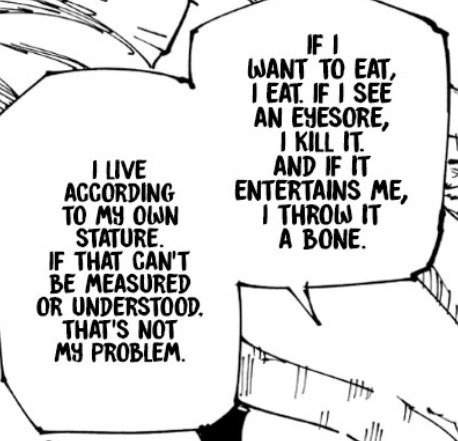
The way he talks about other people really places emphasis on the fact he relies on them for his source of satisfaction in life. If it entertains me, I’ll throw it a bone.’ ‘The perfect thing to slurp up to pass time until I die’. It’s interesting that he speaks of his main source of pleasure in this way, like they are dogs, or food, something lesser than him or something that won’t last as long as him, an acknowledgment of their fleeting nature, which he also directly acknowledges. In that sense, Sukuna is very self aware - to an extent. He’s a poet, a philosopher, an artist in every sense of the world. In 248, we see he’s capable of deconstructing his own behaviours and understanding them deeply, but he will always come to a biased conclusion due to his refusal to change.
If Sukuna is a seeker of pleasure, then Yuji is a seeker of pain, and if Sukuna is refusal to change, then Yuji is change.
Sukuna’s hedonistic mentality cannot survive because it relies upon remaining unchanged, and thus repeating the same journey to pleasure over and over, whether as Yuji, someone who often seeks pain - the opposite of hedonism - is able to get back up again and again, because he accepts change, accepts pain as a part of life, and grows from it, becoming unbreakable.
Sukuna’s pleasure is also not a long-lasting kind, which again links with the Paradox of Hedonism. You cannot equate a happy life with a pleasurable one. Sukuna will simply never be content with the life he has, always searching for something better than the last, something that will satiate him longer, and that is another reason as to why he will lose to Yuji, who once lived by similar principles, and tried to avoid pain, but was punished for it. If Yuji paralleling Sukuna in that way doesn’t say anything about Sukuna’s inevitable downfall, I don’t know what does.
That’s about all I have to say for now, but if you find this interesting, I’d recommend looking into the different theories of hedonism and the counterpoints to it. I have my own personal beliefs on it, but it’s always interesting to see other takes on philosophical theories!
#JJK#jujutsu kaisen#ryomen sukuna#Sukuna#jjk meta#jjk spoilers#manga spoilers#jujutsu kaisen spoilers#JJK Manga#originally I had more written down but I think this still gets the point across?
184 notes
·
View notes
Note
Apologies for bringing up a topic you've already discussed at length, but I've read through your posts on "anti-intellectualism" and completely agree with you on all counts. But I'm just now curious about how you'd define the increased culture of outright rejection of critical analysis (vague though the term is) as opposed to simple disinterest. Situations like people dismissing any deep analysis of systems, media, texts etc with "It's not that deep", or hostility towards fuller and in depth responses to statements (especially on social media with the ever prevalent "not reading that"), with the result often times being that anything requiring slight effort to engage with, or that isn't entertaining is dismissed completely.
Although I understand that these are just peoples reactions on the internet, and not systemic or material issues, I'd love to know your thoughts on how that cultural behaviour and trend could be classed, if not as anti-intellectualism.
(there are obviously a huge amount of external reasons (the attention economy, media, education etc) for people to react in that way, so I'm not blaming people personally, nor do I think everyone needs to go read Hegel and become a master critical thinker, but I do think it is a trend that has some damaging effects, especially as a response to any criticism of capitalism)
talked a little about it here—i guess i would ask what you're actually seeking to accomplish with the word "define," because there's no one explanation that can neatly account for every individual rejection of the practice of critical reading, and nor should we be seeking to find one. certainly 'anti-intellectualism' doesn't cut it, so i would just reiterate the point i made in the initial piece—how people feel about critical analysis, what their base skill level in critical analysis actually is, how that skill level is articulated, what their relationship is to the work or works in question & the respect with which they are willing to treat it are all highly contingent questions which cannot be easily explained away but instead merit thorough materialist investigation. ultimately as marxists we have to be materialists; our investigations should seek these material explanations, which means interrogating normative epistemes, education & academia, how we define "literacy" & its social use + social distribution, who benefits and who winds up disadvantaged. the "anti-intellectualism" position is broad enough to be near enough useless when it comes to articulating actionable responses; i also find it cruel.
also tbqh whilst i do get impatient when people don't "want" to engage with challenging narratives in ways that i find intellectually stimulating and would rather watch marvel film #47384 or whatever, i think it's good to take a policy of, like, blocking and moving on, curating your feed, and remembering that you don't + shouldn't have access to that person's relationship to the media landscape and the sorts of analytical tools that they may well only ever have encountered in a hostile educational setting, as well as working towards showing that engagement with "difficult" works is a) possible and b) fun and worthwhile. often people's reluctance to engage with works that have a (perceived) higher entry barrier (however ethically questionable that perception might be) simply comes from the fact that they lack/believe themselves to lack the right tools for engagement, and don't want to be made to feel "stupid" by not "getting" it—they preemptively go on the 'let people enjoy things'-esque defensive to counter this. the more candidly we talk about critical practices & the more digital airtime we give to less "mainstream" work, and the more space we give people to not understand things/to ask questions/to communicate and share ideas rather than participating in the big pissing contest of who can be the most Media Literate, the closer we get to resolving these sorts of tensions, imo.
120 notes
·
View notes
Text
Step by Step and (lack of) emotional catharsis
I have been reflecting on the Jeng and Pat romance aspects of episode 10 of Step by Step, trying to pinpoint the source of my discontent. Because candidly, I expected to like it more than I did. They finally kissed! They started a relationship! They had several flirty, sexy scenes! Pat pinned Jeng up against a car door and climbed on his back! They made out like fiends on every available surface! I love all that stuff, and normally when I get to this phase of a romance I feel a certain happy giddiness come over me. Not so today, and I think I’ve figured out why.
Before I get into it, let me tell you what I am not doing in this post. I am not getting into the show’s already well-established pacing and editing issues. I am not predicting what comes next, nor do I care for the purposes of this post. And I am not here to talk about whether the events of today’s episode were realistic or in character. There are good discussions of all that happening already (check out this post by @shortpplfedup for a read on what’s happening with the plot), and there are ways for me to rationalize everything we saw and make it fit with what we know of these characters.
What I am interested in talking about, however, is why despite my intellectual understanding of what the plot is trying to do, this episode felt emotionally unsatisfying from a storytelling perspective. And for me, it goes back to this:

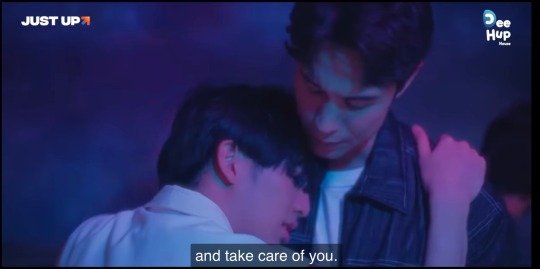
And this:
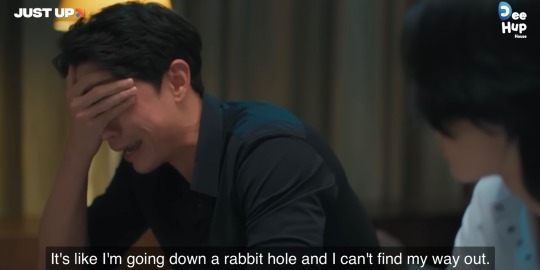
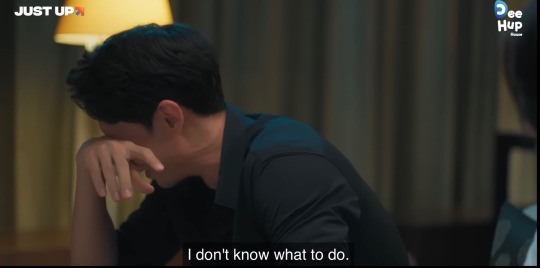
Across nine episodes, this show slowly built up Jeng’s feelings for Pat from a crush to deep affection to ardent devotion. We saw him sink further and further into his feelings week after week. We saw him find ways to be near Pat and care for Pat. We saw him treat Pat with respect at work, make him food, watch out for his emotional and physical safety, and find ways to give him gifts. We saw him beg for the simple chance to be a safe place for him, even if he got nothing in return. And we saw his absolute devastation when Pat first failed to see him, then outright rejected his sincere feelings. We saw him cry in his baby brother’s arms because he was in so deep. We were not just told, we were shown that Jeng’s feelings for Pat are very intense, and that he wants a serious relationship with Pat.
And so you would expect, at the culminating moment of this very slow burn, that the resolution to his arc would hold equal weight to all that came before it. You would expect a moment of catharsis where Jeng’s hurt feelings were acknowledged between them, where he and Pat finally clicked into the same emotional frequency, and where they came to some kind of understanding of how they want to either start fresh or move forward together as a couple.
But that’s not what we got at all. Instead, the show gave us a very brief conversation in which Pat got upset with Jeng for distancing himself from him (after asking Jeng to distance himself from him) and started sobbing, Jeng looked kind of confused, said “I’m not letting you wonder anymore” (an utterly baffling line, the man has confessed like five times at this point), made a couple bemused faces as Pat continued crying while he explained the work situation, and then said “we’re together now” and went straight for a hot and heavy make out (and possibly sex on the kitchen counter).

Now, I am not at all opposed to these characters going straight to sex. Jeng has been waiting a long time, they’re horny for each other, the floodgates are finally open, congrats and have fun, you two! But I must ask, where was the emotional catharsis? Where was the narrative throughline from the devastated and confused Jeng from last week to the curiously chill Jeng of this week? Why didn’t we see a trace of hurt or frustration from him when Pat suddenly came in demanding things he had shut down so firmly before? The Jeng who was always so careful with Pat, who wanted them to understand each other, and who wanted much more than just hot sex and a good time - where did he go?
And if we thought some of that emotional catharsis might come later in the episode, that didn’t happen either. Instead we jumped into a montage where we moved through what appears to be several months of their relationship (the timeline, as ever, is hard to follow, but Ae’s baby looks to be about four or five months old) via a series of scenes where they flirt (in front of coworkers) and have sex (including in public) while ostensibly hiding their relationship. And it really was pretty purely about sex - @neuroticbookworm pointed out to me that despite Jeng’s well-established fantasies of cooking and cleaning and caring for Pat, we didn’t even get to see any domesticity between them. It was work and sex and sex and work. The serious and devoted Jeng of the previous nine episodes became a horny boss who flirted outrageously in the office, decided to give his boyfriend an unearned promotion, and dismissed said boyfriend when he expressed concern about how all this was making him look. At no point in this episode did he seem especially attuned to Pat’s feelings as his anxiety about the office gossip grew (and recall, we had previously been invited by the narrative to notice Jeng’s attentiveness in contrast to Put’s selfishness). And when Pat tried to have a serious conversation with him, Jeng blew him off because he would rather stay in his happy sex haze bubble than deal with the reality of how his behavior is affecting Pat.

Here’s the part where I tap the sign above again and repeat: I am not interested in debating whether this is realistic or can be read as in character for Jeng. For me, the important thing is that there was a significant disconnect between Jeng’s emotional journey through episode 9 and the emotionally lacking resolution we got in this episode. It felt like Jeng, after finally getting his chance, was treating Pat more like a fuck buddy than the faen he so desperately wanted. It felt like the Jeng we know was replaced with someone whose emotions felt lacking in the depth we’ve come to expect from him.
I recognize that this show is not over and we may yet hit on some of these emotional beats I am craving. But we are already moving into the next phase of the story (surprise, more angst!) and this episode did mark the end of the long slow burn we’ve been on with these characters. Instead of feeling like we reached an important emotional climax when Jeng and Pat finally got together, it felt like we got two-thirds of the way up the emotional breakthrough mountain and said oh well, this is good enough, let’s take a selfie and go home.
And for me, it was a letdown.
123 notes
·
View notes
Text
Just saw someone being judgmental towards Buffy and Buffy ALONE for victim blaming in the Beauty and the Beasts episode…..
GEE I WONDER WHY BUFFY WOULD CURRENTLY THINK EVERYTHING THAT HAPPENS TO VICTIMS IS THEIR FAULT AND WAS THEIR RESPONSIBILITY TO PREVENT
Calling out only ONE character in btvs for this behavior, and the one who is victim blamed herself the most is not the call out you think it is…. Like have you been paying attention AT ALL up to this point??? Do you only see the victim blaming when it’s that blatantly obvious???
Btvs has a SYSTEMIC victim blaming problem that obviously stems directly from jw himself as xander is also the biggest perpetrator of blaming Buffy for every single terrible thing that happens to or even AROUND her followed by Joyce, Riley and Faith. Anya, Cordy, and Spike’s (in season 4) are used less frequently to blame Buffy as well with joss pretending they are just being blunt and honest but it’s just furthering the “everything is Buffy’s fault” narrative and that is NEVER countered by the narrative or any of the other characters!!!! Occasionally Willow will advocate for not attacking Buffy or assigning blame but even that is rooted in her fear of conflict and wanting to keep the peace more often than it being about believing Buffy isn’t at fault and just defending her.
It’s not until season 6 and joss is less involved that we finally get Spike telling Buffy “it isn’t her fault” with Katrina and Tara forgiving her for both loving and using Spike and girlie has an entire mental breakdown both times because being forgiven and accepted instead of blamed for mistakes literally DOES NOT COMPUTE and she BEGS to be punished and told she’s wrong because she doesn’t know how to accept anything else because of her treatment at the hands of her “friends”, family and romantic partners for the last five years
Even in fiction we need to practice not just looking at a person’s problematic behavior on an individual level but within the context of the systems they live in and the community they are surrounded by.
If you’re genuinely shocked and confused the parentified slayer who has heard “one girl in all the world” more times than she can count, was blamed by her mother for “not making better choices and having better judgment” when she was the victim of a manipulative and predatory older man and feels responsible for all the harm and deaths ANGELUS caused just because she had sex once AND for having to send Angel to hell and therefore feels responsible for nursing him back to health as well you haven’t been paying attention to the actual dynamics at play or what’s been going on up to that point AT ALL.
#lord protect me from the bad takes and for the love of GOD kept them off my timeline 😩😩😩#mercury retrograding in aries has people saying the dumbest shit without any thought#buffy summers I love you and you deserved so much better and so much more protection#even from your own fandom#if you hate buffy summers please just block me like get the fuck away from me immediately you monster#rant
23 notes
·
View notes
Note
I'm interested in your thoughts about the different way the show vs the novel cuts the timeline, and specifically in terms of how Jin Guangyao is framed. With the show, we're first introduced to Meng Yao as a young man making heart eyes at Zewu-jun and there's a very slow build up of suspicion over time, which allows viewers to get to know and like him more at first before...*ahem*... putting the villain hat on him. In the novel on the other hand (assuming I'm remembering this correctly), we're basically presented with Jin Guangyao as the antagonist almost from the beginning, setting him up for the reader's suspicion and dislike. On the other hand, there's a much more nuanced portrayal of his crimes (e.g. he's not responsible for Every Bad Thing Ever like in Untamed) and the reasons behind them, and an even more clear parallel with WWX as the protagonist. What are your thoughts?
Ohhh this is a super interesting ask and I actually found it an interesting counter to the prevailing Jin Guangyao narrative about his framing in the drama, which holds that he is straightforwardly being painted as The Villain, and while I don't think that's incorrect I do think in some ways it overstates its point. however, I actually think that something specifically about narrative framing (as in, not taking any content changes in mind) here might, perhaps unintuitively, contribute to why the Jin Guangyao of the novel is a more sympathetic figure than The Untamed (tries to) make him.
(once again I came out of CQL like Jin Guangyao Made Many Valid Points, Was If Not Right At Least 75% Justified so like. I actually don't think The Untamed was as good at making Jin Guangyao a Straight Up Villain as it was trying to be. I have thoughts about Zhu Zanjin actively acting against script and how you can feel him pulling against the prevailing narrative and I have thoughts about how that actually interacts very nicely with the way Jin Guangyao in every version of the story is pulling against a prevailing narrative that wants to relegate him to the margins in one way or another. but that's a major sidebar.)
holy hell I wrote an essay so putting the rest of this under a read more.
The point is that I think there's a few things happening here - I will note, first of all, that I don't think we actually are introduced to Jin Guangyao as a villain in MDZS. I believe the first mentions we get of him are actually fairly positive. I went back and checked, and he's mentioned a couple times early on just to note his position as Chief Cultivator (in pretty neutral to positive terms), then identified as the person who gave Jin Ling Fairy, and a few other times including the explanation that he executed Xue Yang to "show that things were going to be different." Pretty shortly after that is the scene where Wei Wuxian finds the kids playing Sunshot Campaign to see how Jin Guangyao is portrayed there (because that's a solid proxy for perception more broadly) and it's pretty complimentary!
"In these types of games, the role of the now-grand-beyond-measure Chief Cultivator, Lianfang-zun, was naturally very popular. Though he had come from a background that most people found too embarrassing to even mention, it was for this very reason that they sighed in admiration over how he'd succeeded in climbing to the top of the cultivation world. [...] He fully deserved the title, and could even be considered a legend of his time. If Wei Wuxian had been playing this game, he also would have wanted to try being Jin Guangyao." (Dew, Part 5)
I do think that's worth remembering, that it's not an immediate jump into "Jin Guangyao bad"; it happens pretty fast but not immediately.
However, it is true that by the time we actually meet Jin Guangyao on page he is under pretty heavy suspicion, and pretty shortly after that is the Empathy sequence, which involves a lot of heavy judgment on Wei Wuxian's part (a very unbiased narrator! of course!) of Jin Guangyao's badness. though that's also the sequence that reveals Jin Guangyao's involvement in saving Lan Xichen, his maltreatment by cultivators in general and Nie Mingjue in particular. So it's...complicated.
But in general, this kind of arc (starting with a character who seems fishy/suspicious or even evil, gradually revealing later on the more sympathetic aspects and drawing a fuller, more nuanced picture of them that's very far from a blanket condemnation and also gets a lot of sympathy from the narrative) is very characteristic of MXTX. She does it all the time, in all three of her books, with pretty much all her antagonists.
(SPOILERS FOLLOW: Shen Qingqiu in SVSSS starts out as a lecherous scum villain who deserves his horrible death and ends as a decidedly tragic and fairly miserable figure that even his #1 hater feels pity for, Tianlang-jun in same is an all-powerful demon lord, terror of the cultivation world -- and he was wrongly accused because the Old Palace Master coveted Su Xiyan. Xue Yang is introduced as a mass murderer and closes as a hand clutching a treasured candy. Jun Wu in TGCF receives the bamboo hat after Xie Lian's beaten him in a truly remarkable gesture of compassion.
Wei Wuxian himself, who is introduced in the first lines of the novel as a terrible evil that has been defeated - this one gets quickly overturned but the fact that it begins there is still significant. I could keep going.)
and while I feel like that's led to some problems in the discourse (namely, people make up their mind about who Jin Guangyao is right off the bat and then dismiss anything that doesn't suit that initial assumption as either false or irrelevant), I also think it's a pretty compelling way to lay out her characters, and does some very interesting things in terms of...challenging the reader to be willing to overwrite some of those early assumptions, being willing to make that change in how they assess a character (or person). I mean, that's a big part of the plot of SVSSS, actually: many of the problems are caused by Shen Qingqiu's unwillingness or inability to see that Luo Binghe is not the character he knew him as from PIDW - that Luo Binghe has changed because of Shen Yuan's decisions. The misunderstandings after Luo Binghe's plunge into the Abyss stem, in a lot of ways, from Shen Qingqiu continuing to assume that Luo Binghe is thinking and acting exactly as his counterpart would, instead of looking at the person who is actually in front of him.
So too, I think the reader is meant to do those same kinds of reassessments in MDZS as character details are parceled out. Notably, the information about Sisi and the Guanyin Temple statue is only revealed after Jin Guangyao is already dead. Everything has already happened, so why put that information in the text? It's one more signpost that says you thought you knew everything but there's still more to complicate the picture and make this even more of a tragedy. You see the same thing with Jiang Cheng and the golden core reveal at the very end - everything has already happened, the great confrontation has already gone down, but here's one more thing. Maybe it doesn't change anything in terms of the narrative, but it's there, it's important.
Now, the problem comes, I think, when people are unwilling to flex on that initial unfavorable impression, and I feel like particularly right now in general a lot of people are unwilling to...change their minds? on things? or to admit they were wrong or maybe making a judgment prematurely? And most obviously this is an issue irl all over the place but I think it happens in fiction, too. The irony here is, of course, that it's replicating exactly how cultivation society in-text responds to Jin Guangyao, namely by taking one thing about him and deciding that says everything about him, regardless of what he does.
To turn to CQL, now...I'm going to be talking about narrative structure from an Anglophone perspective because that's what I know, and that's the part of fandom I primarily engage with, recognizing that what I'm going to say about story patterns may not hold true in Chinese literature; I've read too little of it to say.
I actually think it's interesting that I actually think, while CQL is on the face of it presenting a more sympathetic look at Jin Guangyao to begin with, by putting it in a linear order where the viewer more or less knows what's going on with him through the course of the whole story in chronological order is actually in some ways a villain edit in and of itself without the extra dumping of all the bad things ever being his fault. I say that because that's actually, as a narrative arc, a very familiar one in terms of the path it follows. "Innocent young man falls into villainy" is a classic villain creation trope - and while often it can make for a sympathetic villain it is very much a story that arcs from good > bad > dead.
When it's set up in that linear sort of way, aligned with that sort of familiar path, the reader (viewer) is almost set up to expect what comes; as soon as episode 10 rolls around and Jin Guangyao does something questionable, there's an easy and immediate jump to "oh, so he's going to be one of those" and from there everything he does must be, by the logic of that familiar story, part of that path. He can't get better from there; that's not how it works. He can have a redemptive moment before death, perhaps, but overall once that downward arc begins, the expectation isn't that it'll reverse, and it's a challenge to convince people not to view the rest of the character's story - and potentially back-read into their previous actions - in a suspicious light at best or an actively hostile one at worst.
(Interestingly, I have thoughts/feelings on the way that Wei Wuxian's arc interacts with that sort of story path, which is to say as I've talked about before Wei Wuxian's first life is classic villain origin story. "A smart, clever young man with a healthy dose of hubris acquires sinister powers, gradually gets more unstable and separated from society, and ultimately goes full villain" is the basic outline of Wei Wuxian's story before his resurrection, and that is, I want to emphasize, a villain story. Obviously it doesn't end up framed that way, but viewed from outside that's what it is. The fact that he's extricated from it and gets another chance doesn't actually unwrite that - it gives him another chance.)
So CQL!Jin Guangyao might start out as a more sympathetic-seeming figure than MDZS!Jin Guangyao does, but by virtue of the linearity of his arc on screen (following a familiar narrative path to an inevitable end), I think he's pre-set up to be intractably cast in the villain role, where MDZS!Jin Guangyao, because the reveals of information about him are non-linear, wobbles more. Because the reader doesn't have all the information it (potentially) forestalls making final judgment, or at least calls for a reexamination of judgment. That interrupted arc, with its side trips and detours and glimpses of another story in which Jin Guangyao could've been the protagonist (the brothel flashback occurs to me), makes it potentially a little less easy to mark Jin Guangyao in the villain box and keep him there for forty episodes.
I would say, in general, that the novel encourages a more sympathetic read of Jin Guangyao. But I do think what you've noted here is worth remembering: CQL doesn't present him as a villain or even as sketchy from the start, and the difference is clear in the form of two characters who project "I'm a bad person!" in every scene they're in from the beginning: Wen Ruohan, and to a lesser extent Jin Guangshan.
#conversating#flamingwell#jin guangyao#lise does meta#the sad queer cultivators show#thanks for giving me the opportunity to spend FAR too long writing this and looking up quotes and shit#much appreciated way to spend my afternoon#instead of working
115 notes
·
View notes
Text
A short essay regarding Splatoon 2's base story mode
Splatoon as a series has had 4 story modes so far and I think the one that catches the most flak from the community in general is Splatoon 2's base story. This is very reasonable, the mode is a copy-paste of Splatoon 1's formula with trivial additions, is unhelpfully hindered design-wise by its need to remain playable by 9 completely different weapon types and its lack of engaging content for anyone other than the day 1 beginner makes it genuinely painful to play through for a substantial portion of the playerbase.
But the actual reason I dislike S2's main story so much is the extent to which it was massively undeveloped from a narrative standpoint and didn't really deliver on any of the plot threads set up in the Squid Sister Stories.
I see a lot of people taking those plot threads that were established there and extrapolating to say what "actually" happened in Splatoon 2's story with regards to Callie and Marie. This is frustrating, because instead of lamenting the way the story was handled some people are now putting out theories saying "actually you interpreted this incorrectly, you can put together all these pieces to show that Callie did actually hate Marie and joined Octavio" and that's just....
no.
The problem with the way S2's story was handled is that every motivation it tries to present as a possible reason why Callie left (the driving mystery joining Splatoon 1 to Splatoon 2) is contradicted by something else.
Callie was abducted entirely unwillingly while visiting octavio? The "I'll hear you out" interaction between Callie and Octavio in the S2 character chart.
Callie hated Marie/was burnt out form work and joined Octavio willingly for whatever reason? Blatantly countered by info we have in the Squid Sister Stories (we know for a fact that Callie never hated Marie at any point and the idea that she decided to work for Octavio because of stress is nonsensical). This lack of direction is not helped by the fact that Callie and Marie patently do not go through a character arc duringS2's story
They: start off as close friends and rivals during Splatoon 1 -> grow apart due to work stuff after the events of the final fest (but still have no ill feelings towards one another) -> Callie gets kidnapped -> S2's story happens and Callie comes back -> Callie and Marie are still friends. It's not even established if they spend more time with one another after S2's story mode than before it.
We know from Splatoon 3 dialogue that they still work independently in the same manner that they did between Splatoon 1 and 2 that led to them growing apart, but are just... fine now.
I think there was the clear intent for Callie and Marie to have a full-blown character arc where one airs their grievances to the other about their friendship (maybe about feeling abandoned or that they're not even friends anymore), leading towards a new understanding between the two, but that's not what ends up happening at all.
Splatoon 2's base story is a mess of tantalising glimpses into potential story threads, but delivers on precisely none of them. The Callie and Marie story across Splatoon 1, 2 and (to some degree with their dialogue) 3 gives the illusion of a journey; of depth, direction and a satisfying conclusion, but any attempt to look at it in detail leads to the whole thing breaking apart.
Disconnected from Callie and Marie, I know that some people are disappointed with the direction that Splatoon 3's story ended up taking right at the end. That's fine, (actually it's probably the correct response) but appreciate that Splatoon is definitely on an upwards trajectory when it comes to narrative consistency and the coherence of the story. RotM doesn't even come close to having the amount of infuriatingly underdeveloped plot threads that Splatoon 2's hero mode does.
It's not all doom and gloom yet, we're not entering a "lore dark age". I'm genuinely confident that Splatoon 3's DLC (whenever it appears) will continue expanding on Splatoon world and narrative on the same level as Octo Expansion and I think the community as a whole should be too.
311 notes
·
View notes
Note
regarding the post today about Anna's nasty comments, "jokes" etc about Michael's appearance in the last few years. Do you think there is genuine reason to feel worried about him and what it may be doing to his mental health overall? What I mean is I am starting to worry and then it makes start to spiral a bit and think that if he stays with her longer that the possibility of her "soft bullying" will escalate into actual abuse and I really don't want to think like that but it really makes me worry for him. Please tell me what you think and should I just take a step back and not think on it too hard (am I?) If you agree with me though, what do you think can be done to help him? Like as in a safe way for him to break up with her? I appreciate whatever you can do to help ease my mind at least.
martinsharmony replied to your post "So for those who haven't seen, AL posted a new..."
I have to wonder about Michael's state of mind. He has said he has his own body issues and has struggled with depression etc. The fact that he is "letting" her do this makes me worry about him a little. The fact that he's not standing up for himself and setting a boundary. From my own experience, all of this is okay, until it's not. My heart goes out to Michael. Of course I don't know the real truth. But I see a little of myself there. I recognize it.
(Grouping these two together due to having similar themes.)
First, I am glad that you felt comfortable enough to message me about this and share your thoughts. But I think there are a few things going on here, and it's important that we have some perspective. When I started responding to asks and questions about AL on my blog four years ago, it was largely as a counter to what many of us were seeing the fans do, which was idealizing Michael and AL's relationship and making it into some sort of fairy tale romance. Many of us could see things that did not seem to hold true to this narrative, but were afraid to discuss it openly. So the discourse became about open and honest conversations and speculation, and since GO 2 came out, that discourse has only seemingly increased (if the Asks and Anons in my inbox are anything to go by).
To your comments, @martinsharmony, these are some very good points you are raising, and I'm sorry that you see yourself in Michael's shoes. I think there's a chance many of us do, and is part of why we have the strong feelings we do--one way or the other--about this situation. I think a lot of us see Michael's visible unhappiness and are jarred by the sharp contrast between that and the narrative of him and AL being "madly in love."
I do, however, think there is a real risk of taking that line of thinking so far in the opposite direction. That is, if it's not okay for fans to assume that everything is perfect and wonderful and the absolute best with Michael and AL's relationship, then it is also not okay to assume everything is the absolute worst, because extremes in either direction are not a good thing, and reality often exists somewhere in the middle. Reality and relationships are also infinitely complicated, which means that there often are no easy answers.
Also, because things are not ever truly black-and-white, I think it's important not to conflate being an unpleasant person with being an abuser. There tends to be an assumption that an abuser is mean and nasty all the time, every day, but so many abusers are viewed as "the nicest person you ever met" by everyone but the victim, which is how they are so often able to get away with what they do. Conversely, someone (such as AL) might be self-absorbed, immature, and annoying, but that does not make them an abuser.
Again, in no way, shape, or form am I saying that it is a bad thing to care about Michael, or to want him to be happy. But what we are ultimately talking about here is Michael's agency--that is, his right to make his own choices, and to deal with and feel whatever he feels about the consequences of those choices. By either romanticizing or catastrophizing his relationship with AL, we are unintentionally removing that agency. We have to remember that Michael is an adult man who has been in many other relationships in his life, and has navigated those (with varying degrees of success) on his own. So while we can have conversations and engage in discussion here, it is very much not appropriate and not our place to intervene with any of this personally or to try and facilitate the breakup of Michael's relationship.
Remember, too, that Michael has people in his life that he can trust and confide in--his parents (who are still alive and live near him, bless them), his sister, his friends. And he has David, of course, which we know is a beautiful thing. He and David have gotten immeasurably closer over the last four years and it is genuinely heartwarming to know that he can turn to David. The point here is that while we are fans of Michael's, we are not his family nor his friends. But Michael is not alone in this, and has support available to him, and that is something to be grateful for.
Going back to my previous comments about agency, one of the things that I know I love about Michael is that he is always going to do what he wants to do. He has reasons for doing those things, which means that if he is still with Anna, there is a reason for that (even if it is, as many of us believe, due to wanting to be there for the kids). And if/when Michael should decide to break up with her, there will be a reason for that as well. The most important thing, however, is that it's his choice. That if he decides he's made a mistake, it's his mistake to own, and not something for us to save him from.
I hope this has helped to put your mind at ease. I also want to make it clear that I absolutely do not have all the answers, and this (like all my posts) is my own opinion. Taking a step back might still be a good idea, as we can all find ourselves becoming too invested from time to time, and it is good to take a breather on occasion and find perspective. Glad as always for my followers to share their thoughts on this post as well...
#harmoniaserpentine#martinsharmony#reply post#michael sheen#welsh seduction machine#relationships#also i have no doubt Michael has set boundaries and spoken up for himself#so what we see on social media might just be what he is barely willing to tolerate#but that is a whole other discussion for another day#anna lundberg#thoughts#discourse
52 notes
·
View notes
Text
To the Nonnie who commented on how I don't report everything.
First, thank you for the kindness and empathy for what Israeli and Jewish people are currently going through. It is appreciated at a time when we're being de-humanized. I'll just say that this is not what we're dealing with every day now. It's what we're going to carry with us every day for the rest of our lives. I know so many who feel that life is divided between before Oct 7 and after. I'm one of them. This is what trauma does, and we are now a traumatized people in our lifetime, no longer carrying "only" the trauma of previous generations.
Now back to your comment. I understand what you're saying, but I hope you understand where I'm coming from. I am doing the daily update posts in a sense as a reminder that Israelis are human beings, the counter to a de-humanizing narrative being pushed about us. I want people to understand what Israelis feel, think and experience. For that, I'm trying to share what Israelis are exposed to, stuff that others are likely unaware of. I am not a news outlet, I am not trying to report on everything, and if there is something that I believe people probably know, I don't see the point dwelling on it in posts that I already have trouble keeping short, relevant and readable.
So I guess what I'm saying is that my posts are, first and foremost, an attempt to push back against this new antisemitic narrative, that de-legitimizes the experiences and humanity of Israelis (and fellow Jews who support them).
Like I said, I hope you can understand! Have a good day.
(for all of my updates and ask replies regarding Israel, click here)
#israel#israeli#israel news#israel under attack#israel under fire#israelunderattack#terrorism#anti terrorism#antisemitism#hamas#antisemitic#antisemites#jews#jew#judaism#jumblr#frumblr#jewish#ask#anon ask
20 notes
·
View notes
Text
A bit of a meta for the birthday boy, because it’s something I’ve been thinking about for a while:
I think, when talking about Law’s characterization, especially in regards to arguments that he’s secretly (or not-so secretly, your mileage may vary) a big softie, one interaction that I don’t see getting talked about too often is the fact that, when the fight with Doflamingo is all said and done, he goes back and saves Bellamy.
Now, Law does seem to have a habit of just…saving people, sometimes counter to what seems like conventional logic at the time—him showing up at Marineford to yoink Luffy and Jinbei out of there is kind of a perfect example of that. And if you want to be as objective about those situations as possible, you could say that every other time he rescues someone, it’s purely a strategic choice. (Once we get to Wano and the rooftop fight the narrative seems to give him a little more explicit emotional investment in his reasoning, so you can make an argument either way, I think).
But…Bellamy.
Bellamy, who Law has every reason to be pretty damn pissed at, given his role in distracting Luffy from getting back to the rooftop fight with Doflamingo (even if it was largely his sassy, shit-talking mouth and the fraught emotions being thrown around that made that fight escalate so fast). Even if he was feeling unusually charitable, there’s no angle where saving Bellamy is beneficial to him. Heck, even Bellamy is confused as to why Law saved him. He claims it’s because Luffy called him a friend, but when pressed, he gets defensive really fast.
But here’s the thing. Luffy would never have expected Law to go out of his way to pull Bellamy out of the rubble. Luffy clearly didn’t want their fight to end the way it did, but he’s always owned his own decisions, and Bellamy had made it clear that there was only one way he was going to stop fighting. And eventually, Luffy had to respect that. Nor was he--to our knowledge, anyway—awake at any point after the fight with Doflamingo to ask anyone to make sure Bellamy was okay.
And yet, we have Law—Law, who has multiple gunshot wounds to his torso, recently had his arm reattached after experiencing traumatic dismemberment, who is so exhausted he had to cut into his lifespan just to keep going, and who is experiencing one of the most emotional periods of his already incredibly fucked up life—going out of his way to grab Bellamy. And I do mean, ‘out of his way:’ Bellamy was left underneath the palace, and by the time the fight ended, Law is who knows how far away in the middle of the city. He had to make an effort to get all the way back to the palace, grab Bellamy, and bring him to Kyros’ cabin. (And then arguably take care of everyone’s wounds on account of probably being the only person in that cabin with medical knowledge and hey, why do so many people think he has no stamina? Because he seems more like the damn Energizer Bunny to me).
You could make the argument that Bellamy needed to be left alive for something later on down the line—and it’s One Piece, so that is an entirely reasonable train of thought—but based on the cover stories we know that Bellamy has retired from piracy to become a dyer. There aren’t a lot of avenues I can see where he becomes a critical piece in the story again. Show up? Sure, we love cameos. But to be necessary? I’m not sure.
We, as the audience, get to see Bellamy go through the full process of his disillusionment with Doflamingo during the events of Dressrosa. And I don’t think it’s a stretch at all to argue that that is something Law knows very well. Once upon a time, he hung his hat on Doflamingo to try and get where he wanted, and that turned out very badly, and here is this man going through what probably looks like a very similar process. Their circumstances are very different, but there's a solid throughline there. And maybe that really had nothing to do with it at all, and Law really is just a softhearted person with a prickly outer shell, but it's an interesting parallel to think about.
So yeah. Law’s motivations, as they have been for most of his general existence outside of Dressrosa, are a mystery here. And I think this is what makes him such a fascinating character, because more than most characters in the series, you can’t really take his words for what they are. You have to watch what he actually does. And what we see him doing is griping and moaning about all sorts of things, and then doing them anyway. Every single time he’s asked to help someone, he complains—but at no point does he actually not help. We see it with Bellamy, and we see it with his intentions to get the Scabbards to safety even before Luffy asks, and even with the kids on Punk Hazard, who he did in fact help when all was said and done—and from the sound of it, made it as easy a process as possible, given some of them say the process was kind of fun. (But Law and his intimate knowledge of how terrifying doctors and medicine can be for little kids is a conversation for another time).
Is he the nicest guy? No, definitely not. He's kind of an asshole, and abrasive, ruthless and calculating, and regardless of how well-founded or not his actual reputation is, he definitely still plays it up a little bit. (But then, everyone gets to be at least a bit of an asshole in One Piece, and I love that for the characters. I don't want paragons of heroics, I want people).
But he's also the guy who goes out of his way to save people. And even if he doesn't seem to know how to admit to any sort of altruism, or view it as a particular good trait in and of itself, and even if he's garbage at accepting honest thanks for his help, it keeps happening.
Is it still impossible to predict what he's going to be doing in the future, now that he's not constantly around anymore? Yeah. But a lot of people wouldn't be around right now if it weren't for him, and I don't think they'll be forgetting that anytime soon.
(Even if Law might wish they would).
194 notes
·
View notes
Text
Precure Day 241
Episode: Yes! Precure 5 Go Go! 42 - “Komachi's Decision and the Arabian Nights“
Date watched: 10 January 2024
Original air date: 7 December 2008
Screenshots
Precure Metamorphose Gallery | Sky Rose Translate Gallery
Project info and master list of posts

Komachi, fabulous she, shielding and blocking
You know what’s fun? The night. What’s more fun than night? An Arabian night! What’s even more fun than an Arabian night? How about a thousand and one of them? Yes, today we are going to dive into another classic story to fight some bad guys, and learn some lessons along the way about self-worth. Let’s dig in!
The Plot
Anacondy pays Shibiretta a visit to implicitly threaten her job, so the witch gets fired up in plans to retaliate against Eternal’s second in command, as well as capture the Rose Pact.
Komachi and Nozomi are chatting in the library about the value of stories and just how many of them there are that Komachi’s could get lost. Nozomi tells her that no matter what, she’ll find her friend’s book. Suddenly, everyone finds themselves sucked into another world… or several, and facing unique individual threats from their stories.
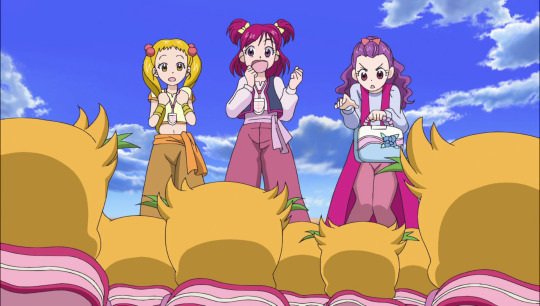

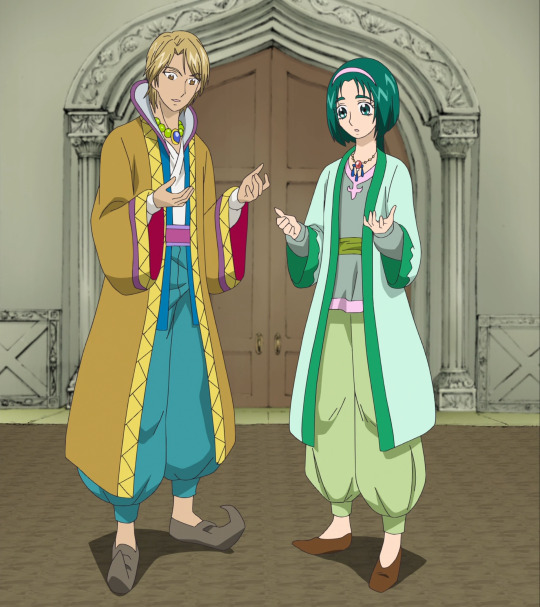
Despite being separated, the girls and fairies figure out that this is another of Shibiretta’s plots and manage to reunite with each other by following the narratives and intents of the tales. They confront the witch and tell her she’s using stories wrong, which she rebuts as they’re just tools to use however she wants. Everyone was able to reunite with each other because they respected the stories. Nuts adds that the story of 1001 Arabian Nights is about a woman telling stories to the brutal king every night, in an attempt to get him to soften his ways; and what Shibiretta is doing is completely counter to that narrative.
In response, Shibiretta creates a genie Hoshiia and kidnaps the fairies and rose pact, so the girls transform, and the battle moves outside of the palace. They have trouble fighting it, since it can turn into smoke and their attacks just pass right through it.
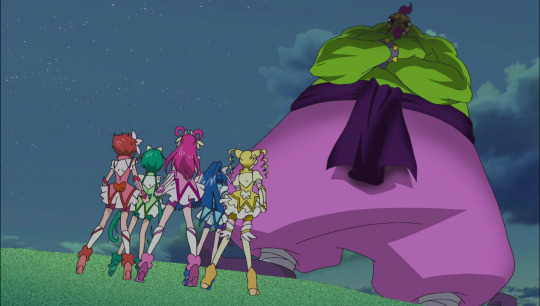
Cure Mint and Shibiretta engage in a verbal tete-a-tete: the Witch from Eternal says they both uses stories to suit their needs, but Dream defends Komachi saying her stories are exciting and heartfelt and she loves them, while Shibiretta just makes messes of existing stories. Shibiretta retorts that she tried telling stories to the director, and he was unmoved, causing Mint to shoot back that stories won’t respond to her methods. They fight again; Milky Rose defeats the Hoshiina while the Cures take out Shibiretta once and for all with Rainbow Rose Explosion.


Before the world dissolves, Aqua assures Mint that all of them are looking forward to her next book. Over in Eternal, Anacondy remarks that a report for this would be pointless.
At dusk, Komachi tells Nuts she wants to write about her amazing friends and share the feelings of all the good times they have together, in hopes that if someone lonely reads it they'll be inspired to find friends like hers. Everyone else was listening in and all of them want to be the main character of her story, with their own spins, and this ends the episode.
The Analysis
What I Liked
It’s one of the better Shibiretta episodes. I’ve often criticized her episodes for only using the surface elements of the story and not putting the characters through the plot. This time they actually addressed that and made it the entire point of the episode: Shibiretta is only taking advantage of the stories for what she can gain from them (monsters and distractions to attack the precures) and not the underlying morals and emotions. I thought it was especially poignant how she said she had read stories to the director and he was bored, so that means stories are worthless at inspiring emotion; and Komachi shoots back that it’s precisely because all she does is to use stories like tools.

Also, as per the narrative, you can actually see the difference between embracing the story and using it as a tool. The girls are able to reunite by understanding the tales that they are in. Rin kindly asks the magic carpet to help them and it responds. Urara’s sincere feelings to protect Syrup revert him from 40 clones of himself back to one. Nozomi uses “Open Sesame” on the door, and later Karen asks for a sign of the right way to go to find Komachi. It’s a bit convenient but hey it works.
On that note, as usual the antics that the girls get up to in the story world are great, they make some good jokes and gags out of them. The 40 (actually 39) Syrups, the magic carpet, the “Open Sesame” scene and of course the genie Hoshiina, all great uses of the setting. I also like their outfits.
I feel like Nozomi and Komachi are one of the less explored pairings in this series. Sure, Nozomi was the one who first enticed Komachi to become a Precure, but they haven’t done much together since then. Komachi is usually paired up with her longtime friend Karen, and there was that one time she and Urara had a really good bond. It’s true that everyone has been supportive of Komachi’s writing throughout both seasons, but this episode is the first time that Nozomi explicitly praises, uplifts, and defends Komachi’s writing and what it means to her, and that translates to a really great climax where they work together to ward off Shibiretta.
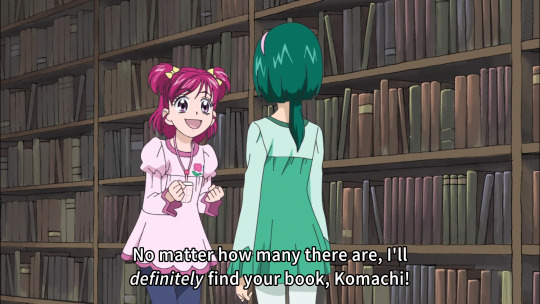
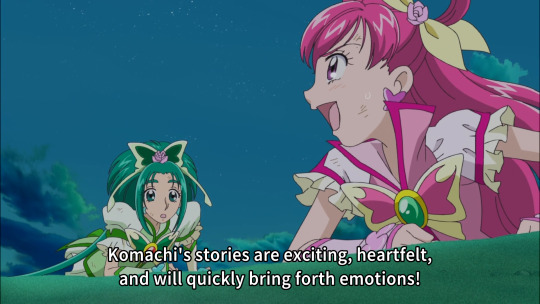
The fight against the genie Hoshiina that turns into smoke kept me on the edge of my seat. Its permeability is a distinct advantage but then Rose turns around and uses that to her gain, before dealing the finishing blow. It’s the kind of creativity I live for here.
Similarly, the battle of the Precure against Shibiretta was really well realized with some great stylized animation and action. Shibiretta launches herself like a rocket, but Mint and Dream combo their attacks to deflect her, and then Lemonade and Rouge kick her out of the sky so the team can perform their final attack on her.
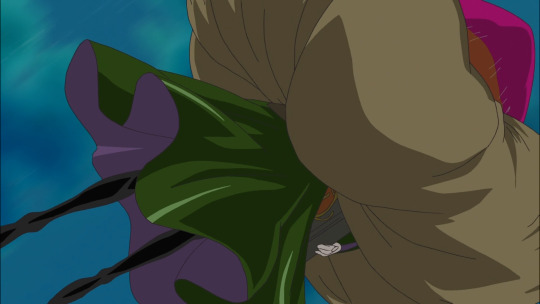
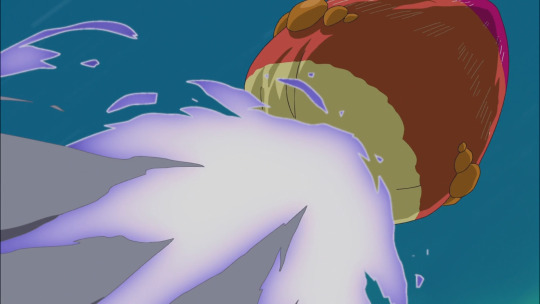
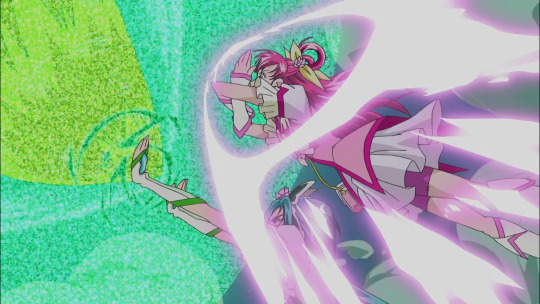
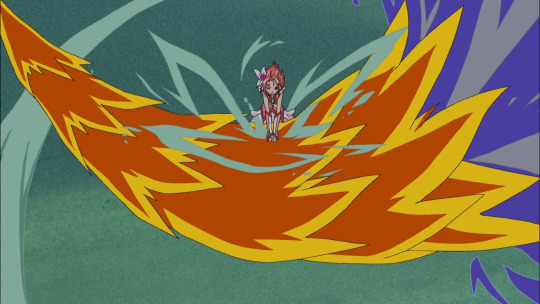
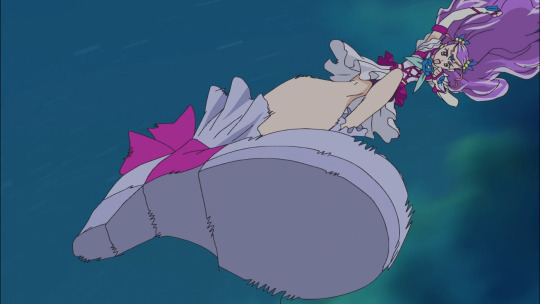

What I DIdn’t Like
Nothing comes to mind.
Miscellaneous
When Nozomi uses “Open Sesame” on the cave entrance, she does Kamen Rider’s henshin pose.



One Thousand and One Nights is a compilation of stories from the Middle Eastern region, from a variety of authors and tracing origins back over a millennium. The earliest known mention of the central character Scheherazade is in the 9th century, but many of the individual tales are believed to be much older, hailing from India and Persia. Over time stories from West African, Hebrew, Greek, and other traditions made their way. It’s a dynamic work that was passed down by storytellers over many generations and cultures. There’s no singular version of the text, there may not even actually be 1001 stories as some of the most famous ones, which incidentally are the ones featured in this episode (Ali Baba and the Forty Thieves, Aladdin and the Lamp, The Tale of Sinbad the Sailor) were actually separate stories that later got rolled into the collection much later. Trying (and failing) to unravel this complex history to give context to the references in the episode was a bigger undertaking than this blog merits.
In the scene where Syrup is supposedly cloned 40 times, as the 40 thieves that attacked Ali Baba, there are actually only 39 of him.
Conclusion
This was a fun episode exploring some real juicy feelings about anxiety and the future and legacy, and also the purpose of stories. It was a nice sendoff to Shibiretta, whom I’ve had very mixed feelings about throughout the show. She was a step up from the duo but solidly middle tier as far as Precure villains go. Smile Precure will give us another witch character to play around with so when I get to that series I’ll do a compare/contrast.
Next time on Precure Daily, Nozomi comes face to face with the director of Eternal! Look forward to it!
Pink Precure Catchphrase Count: 1 kettei!
7 notes
·
View notes
Text
Destiny's Lore, and Why It Didn't Need The Witness
So, I know most of you follow me for Worm or DC stuff, so here's an admission of my tragic past: I used to be a big Destiny fan!
I know, I know, i'm losing followers by the letter, but in my defense, I dropped out years ago, around Shadowkeep. I briefly checked the game out again during the Witch Queen but never actually finished the campaign since I didn't have any friends to play it with at the time and so I couldn't force myself back into it's goddawful grind.
To be clear, I've never played Destiny for the gameplay. I'm one of those weirdos who actually really, really liked the setting's lore and world building. It was one of the most unique things I'd ever seen, this really engaging mix of high fantasy and sci-fi all at once. And you know what? Some of Destiny's lore books are honestly incredible! The writing is emotional, the prose evocative, so many alien perspectives expertly captured. The Books of Sorrow, Thorn, Truth to Power, Book of Unveiling, The Ahamkara gear...goddamn, they're so good.
But I got caught up on Destiny lore a little bit ago, and...wow. Bungie did it. They killed the last thing I still loved about Destiny. And they killed it with the Witness.
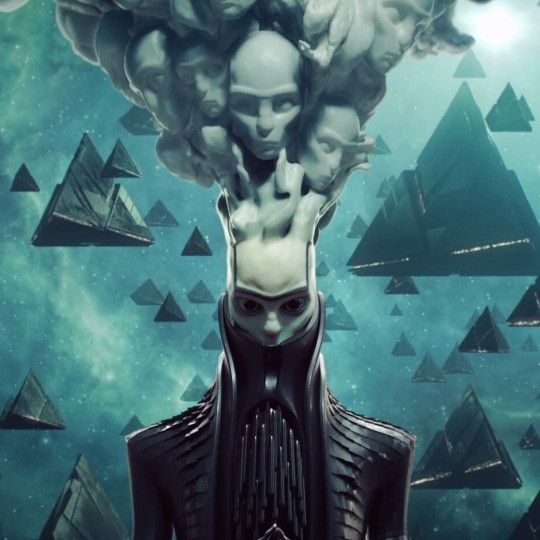
Let's talk about the Witness for a bit. The Witness has taken the slot of the new Big Bad for the Destiny universe, previously held by The Darkness. Their backstory is that they used to be individuals of a race that was the first to be blessed by The Traveler, Destiny's slated Big Good. This race proceeded to have a golden age that lasted for eons, with them eventually running out of things to do, and thus asked the Traveler to tell them what their purpose is. Obviously, the Traveler didn't answer, and their entire civilization had a collective existential crisis so hard that they decided that if the universe didn't come pre-built with a purpose, they'd just kill everyone and reboot the universe so that it did. To accomplish this, they tracked down the Traveler's never-before mentioned Dark counterpart and all fused into a single being, seen here.
And on the topic of the Witness's appearance, I'm sorry, but the visual design here is just...bad. It's just bad. It's almost painfully generic. They have a geometrically rippling long black coat with no defining features, a pale human-ish face, and their brain appears to be leaking other faces in a smokecloud constantly, which i think looked far cooler on paper then it did in a render. Compare this to Savathûn or even Oryx's visual designs and they don't hold a candle.
Speaking of comparisons to the Hive Gods, this is where my rant truly begins, so buckle up.
The fact that the Witness has all but replaced the Darkness- newly released lore suggesting every time we thought a character was interacting with the Darkness itself, it was really them talking to this character- that the Darkness is now stated to be completely apathetic and unintelligent, nothing more then a power source to draw upon- not only runs directly counter to some of my favorite lore in the franchise but cheapens every other Darkness-affiliated plot line and character.
Not only does the Witness not speak at all like The Darkness has in the past, making the claim of them being one and the same dubious to me, but it also results in all of the Witness' Disciples (their right-hand men) being shoehorned into storylines in ways that feel almost painfully lazy.
Case in point: The Lore of the Hive. As mentioned above, The Books of Sorrow is some of my favorite sci-fantasy with fantastic horror elements and incredibly evocative bits of prose. It's a gripping narrative how in the face of utter annihilation, a group of siblings make a desperate bargain with unknowable creatures once kept buried beneath the earth...and how their once noble efforts to save their people from death turns into a bloody conquest across the stars. It's an excellent tale, showing us how the truest test of character is who you are when times are hard- will you let those hard times twist you into a foul shape, or will you endure in spite of them? It establishes the cosmology of Destiny, with the Hive and Worm Gods being established as some of the most powerful and important beings in the story, powerful disciples of The Deep.
With the new retcons, Rhulk (a Disciple of the Wintess) shows up, basically tells the Worms to shut up and listen cause he's the real Disciple of the Darkness, not them, and they're going to fall in line now. Because now, instead of the syzygy being a real threat that did devastate the planet the Krill lived on, Bungie's saying that the entire thing was a lie created by the Witness and the Worm Gods.
Which takes the aspect of "sometimes bad things just happen but it's up to us to choose how we will let those things change us" that's key to the narrative and completely removes it- which is so backwards from how this all works! Evil lives in all of us, waiting for when we're weak to tempt us into doing what's wrong in the name of survival or pleasure or whatever virtue it disguises itself as- it doesn't stroll up out of nowhere and create a twelve-step-point-plan to ensure that we become evil too!
Putting aside that, as I admit it's a subjective criticism based on my own perspective on the nature of morality, I think it greatly cheapens multiple other stories. Now that the Darkness is completely amoral as a force and it's just the Witness who is corruptive, I guess Dredgen Yor, Jana-14 and all of the other guardians we've seen fall were all getting brain blasted by this one dude, instead of their falls being a result of being seduced by power they should have known better then to touch blindly.
Now, I can already hear people saying "But what about Stasis!" And yeah, I have Thoughts on Stasis too. I don't entirely dislike it, but I do dislike how it's been executed.
Sword Logic works- or worked- by basically asserting yourself above physical reality. "I am the strongest thing alive, and I prove it thus." You defeat a powerful enemy and take their strength for your own. That's something you can work as being doable without inherently corrupting you. After all, it's not considered evil to fight for your own survival or for the protection of others. It just so happens that constantly introducing your brain to the idea that killing other things will make you objectively better then them is bad for you even if those powers weren't sourced from a primordial consciousness that has and will try to influence you for it's own ends.
To use a metaphor, Sword Logic is akin to something like nuclear power- sure, it's got one hell of a kick, but if you let your guard down around it, not only will it fuck you up but it'll contaminate everything around you with the fallout.
But now to say that "nope, the darkness is totally fine and not even alive and aware it's just the same thing as the light but different colors and this whole time it's just been this one guy who's been ruining it for everyone else" is so...god, it's so much less interesting. And I think ultimately, that's my problem with the Witness. As a whole, they are just so much less interesting then what we had before!
I loved the Books of Sorrow and Unveiling so much because it was such a fascinating display of completely alien thought and genuine nuance. The Darkness doesn't do what it does because of any tired trope of "evil nihilist" or just might makes right, it's a living embodiment of a cosmic philosophy in a war with another, both of them arguing for how all of creation should work. Whether or not the only things in life that matter are the things that live, and that to live is to suffer so ergo only that which cannot break should live, so you must break everything until only the absolute strongest shapes remain- or if it is possible for creativity and diversity and soft things to exist and create a life that is worth living in spite of the inevitable pain we all go through.
That is so much more interesting then a bunch of dudes who are ultimately just mad about the fact that there's no easy to find and read manual for our purpose in life! It's such a basic, not to mention human motivation in comparison to what The Darkness had when it was a character in it's own right.
And so...yeah.
#Destiny 2#Destiny 2 spoilers#The Witness#The Worm Gods#The Hive#The Darkness#Destiny 2 meta#Destiny 2 lore#god the fact that Unveiling just#isn't canon anymore kills me#some of the best microfiction i've ever read#lol nope have this vapehead emo#it's like DC Comics all over again#sorry to my regulars who follow me for worm but im so mad about this#im pretty much just ignoring everything post-Witch Queen now#so incredibly annoyed at Bungie#it really does just feel like they wanted another quick and easy villain to defeat who's the source of all bad things ever#and then shift their focus to that Marathon reboot#which is an extraction shooter...ugh
12 notes
·
View notes
Note
I don’t get how you’re a Rhaenyra fan but a Dany hater 🤨 like Rhaenyra committed a lot of atrocities in the end.
I don’t hate Dany! She’s smart, she’s funny, she’s got some of the best magical scenes in the series - she’s got some of the best scenes in the series, period, her last dragon fever dream in agot is like top 10 for me easy - and she’s a character that is conceptually similar to like, theon or ned or cersei in that she is really firmly rooted and informed by her past traumas, and I love characters like that from a writing standpoint. I have definitely talked more negatively about her bc it’s basically impossible to not be constantly inundated with takes i feel are just the most vapid or deranged or whatever takes in the world, but you can say that for anyone who feels anything at all about dany bc she is a very polarizing character! i think some of her narrative is frustratingly written, i do not mesh well with a large section of her fanbase, and i actively hate her show counterpart, but show dany is a vastly different character than book dany is (i mean just age alone, like with robb and jon, some of your sympathy evaporates bc they are too damn old to be acting this stupid). ultimately, a lot of the "hate" people think i feel for her is directed at what i feel are stupid opinions on her character or her show counter part's place in pop culture, or just like, normal analysis and critique that i do of every character in this series.
i will acknowledge that i tend to describe myself as "pro stark, pro blacks, pro smallfolk" so people know the general gist of what they're signing up for when they start interacting with me, but that is such a simple way of diluting all of my feelings for all of these characters. like "pro stark" in the sense that they are the most rational of the leaders we get in the main series, and have a connection to the land, people, and culture that is important, but i've pointed out plenty of times that robb's war is harmful to the people of the riverlands, regardless of whether he's justified or not, and i've been posting about how ned and cat fail to properly prepare their children (and the north in general) for Real World Politics, to the detriment of their kids. "pro stark" in the sense that i thought show dany wasn't just deranged from season 1 she was also wildly unlikable and nauseatingly stupid, you could see her "dark dany" turn coming from a mile away because these were not subtle writers interested in exploring why dany would decide "dragons plant no trees" and instead focused on her looking hot while she set shit on fire (same way they were less interested in looking at why jon failed as lord commander and had him be the action hero fighting at hardhome). definitely most of my aggravation at "dany" is at the show version, and while i do get why people feel that if you're a proponent of the "dark dany" theory that you're "anti" dany, but I am not anti book dany! i just think like rickon stark, shireen baratheon, jojen reed, aegon vi, etc she is very much doomed to die a very tragic death.
and i do not like characters based on how little atrocities they commit lmao, like, if i were to list my top 10 favorites, probably half of them have committed some extreme war crime. theon is a rapist! jaime is a shitty ass partner to cersei, a deadbeat dad despite living in the same building as his kids, and a failed child murderer! bran is mind raping hodor, understands on some level that what he's doing is morally repugnant, and keeps doing it anyway! pretty much every targaryen i like has committed some sex crime heinous enough to get them life + 25!! bobby b raised joffrey!!! i know i facetiously say shit like "rhaenyra did nothing wrong" but i'm well aware she's out here torturing people, same as like 75% of the characters we interact with in the whole series. so "rhaenyra commits atrocities" or "dany commits atrocities" is just not how i look at these characters (and not to get into stan wars here, but good lord, "rhaenyra commits atrocities" she is not the only or even the worst person in the dance! like 85% of these people suck and the ones who don't - which is limited to like, helaena, jace, nettles, and addam almost exclusively - either die or disappear because That's The Point. also, i was raised SDA alright, you gotta be a really compelling character for me to get past being super catholic, it's in my dna to be a spiteful hater of catholics!! catelyn stark is my one exception to this rule folks!!!!).
as to why i like rhaenyra - for one thing, saying that emma d'arcy is a better actor than emilia clarke is like saying cillian murphy is better than bradley cooper. they are just not on the same level lol. i definitely have my critiques of show!rhaenyra's writing but i also think she's miles better written than show!dany and her story is also more interesting because her writing is much less nonsensical. for another, i think book rhaenyra and book dany are wildly similar characters (for a reason!) meant to be in conversation with each other, and i very much enjoy what that conversation is saying about power, nobility, gender, sex, war, and identity. on a more technical level, while fire and blood is a mess writing and world building wise, the one thing it does better than the essos chapters (because it doesn't take place in essos, it takes place in westeros, and george struggles much less fleshing out "western poc" than he does "eastern poc" ya know) is that rhaenyra is not the only insight we get into the conflict. the people she loves, the people she rules, the people she harms, they all have a pov and a voice in a way that missandei, irri, jhiqui, rakharo, jhogo, grey worm, on and on, do not, the way that basically every single character that isn't westerosi except mmd (who was killed in book one) is not afforded. it's just a lot easier (as of right now) to talk about rhaenyra as a character because we have her beginning, middle, and end and the povs of people who hated her vs dany, we have the beginning and middle, a lot of arguing over what her end will be, and no one in the narrative as of yet who has even the barest criticism of her decisions besides cardboard cut out villainous slavers.
so like...no i do not hate dany, and i don't feel it's necessary to asterisk every post about rhaenyra with "i know putting a hit out on nettles and addam, locking the smallfolk into KL without easing their burdens of the war, positing herself as an exception to male line primogeniture instead of pushing for absolute primogeniture, and using torture on tyland and vaemond's family was fucked up, i acknowledge that she's flawed" when i talk about her, nor do i feel the need to defend my position on dany on the off chance one of her more annoying stans finds my posts and decides i hate women because i said i didn't like her sexual relationship with irri.
#asks#anons#anti daenerys targaryen#i tag 'anti x' so people can filter the posts out. like i have 'anti x' tags blocked bc some of the opinions of my moots annoy me alkjdfs#but i otherwise love and cherish those moots ya know!! with very few exceptions i don't actually hate any of the characters.#they're deep! they're well written! they feel very real! it's not 'anti' to think a character who burns people alive is a villain tho!!#grrm critical#fire and blood critical#f&b critical#i can't remember what i tag that as#i hope this rant makes sense#anti game of thrones
13 notes
·
View notes
Text
Dean’s Soul in the Bardo - The Art of Dying 1x06 The Winchesters
Catching up British-time, so a bit late to the party as usual, and coming to it fresh, as I like to do, without jumping into the time-line first.
Screeches a bit because I am overwhelmed.
This episode suggests that, on one level, we can read every character in The Winchesters as manifestations of Dean’s consciousness, as he hovers in the “bardo”, the liminal realm in Tibetan Buddhism, between death and reincarnation.
Mary - the leader and hunter who wants to get out of hunting; John - filled with wounded rage, Daddy-issues and violence; Carlos - the fabulous bisexual who dares to get into therapy and to go after the men he wants; Lata - the abused child who manages to chose love over violence - ALL OF THESE ARE ASPECTS OF DEAN WINCHESTER’S being, his experience/ soul/ desires <sobs a little because it’s beautiful>.
Now I’m back on my meta, I’ve previously mused on The Winchesters as a reparative narrative told by Holy Ghost Dean Winchester; a counter-point to the traumatic narrative of Supernatural.
1x06 The Art of Dying offers further illumination and elaboration on that concept, namely:
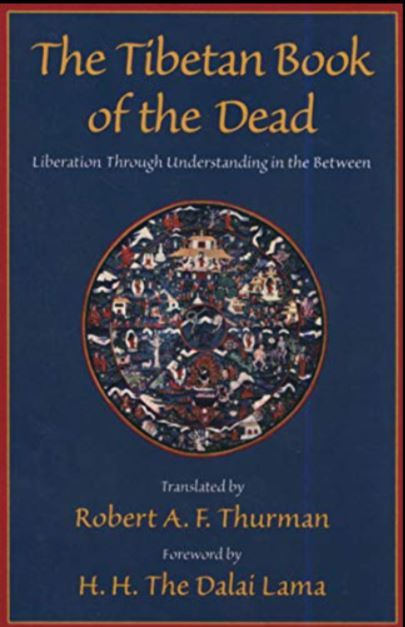
The episode title, “The Art of Dying” is a George Harrison song, the right time-period for The Winchesters (1970), from his album All Things Must Pass.
The Beatles, in keeping with the hippie counterculturalism of the time, were interested in Eastern spirituality, particularly Hinduism and Buddhism, and this Harrison song was inspired by his reading of Timothy Leary’s The Psychedelic Experience: A Manual Based on The Tibetan Book of the Dead (1964).
Harrison’s lyrics are about the religious philosophy of perfecting the soul through cycles of reincarnation:
“There'll come a time when all of us must leave here
There's nothing Sister Mary can do, will keep me here with you
As nothing in this life that I've been trying
Can equal or surpass the Art of Dying....
There'll come a time when most of us return here
Brought back by our desire to be a perfect entity
Living through a million years of crying
Until you realize the Art of Dying “
A theme which fits well with the Ouroboros (serpent swallowing it’s own tail as it ascends) narrative of latter-day Supernatural, which drew on Jung and esoteric alchemy to manifest the Winchesters’ journey as the journey of the soul towards God.
The Tibetan Book of the Dead is the Bardo Thodol, which means “liberation through hearing in the intermediate state”. It is a 14thC esoteric text (or possibly older but that’s when the written text we have dates from).
John, Mary, Lata and Losy all struggle with pain, parent-induced and violence-induced and hunting-induced trauma, but they are able to communicate their feelings to one another in a way which is strikingly and remarkably different from the enormous struggles with emotional articulation which animated Supernatural, which we watched Dean suffer with throught his life.
So we can read The Winchesters as Dean’s revelatory hallucinations in the liminal state between death and liberation (or rebirth) - his revelatory sexual and emotional healing soul-dreams (in which, and what could be more Freudian, he returns to the scene of his parents).
And look, Lata is teaching John, who surived being possessed by the vengeful spirit of abused-as-a-child and violently out-of-control Mac, how to meditate and achieve higher consciousness (with an image of a globe in the background):
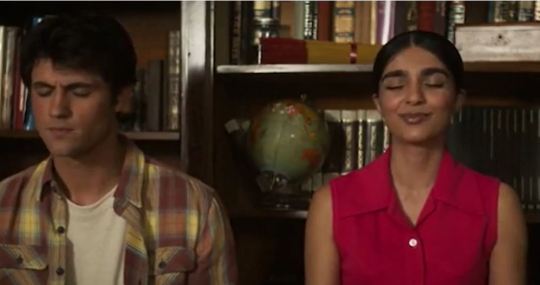
And isn’t it interesting that the rare type of vampire which Mac’s vengeful spirit first possesses is called a “soucouyant”, which means (incongrously, one would think) “carefree” in French. But not so incongruous if The Winchesters is about the journey of Dean’s soul to liberation, to bliss, to being “carefree”...
#Supernatural#The Winchesters#The Winchesters meta#SPNWin 1x06#The Art of Dying#Holy Ghost Dean Winchester#I am in love with this concept#The cycle of death and rebirth#Ouroboros narrative#The Tibetan Book of the Dead
103 notes
·
View notes
Text
Bonus review: Migration! The episode where Luka knowing the identities is finally acknowledged in the most disappointing way possible.
We start the episode with my SO being shocked that Luka knows. In his defense, Wishmaker aired over a year ago and Luka's knowledge has been ignored since then, so I can't exactly blame a casual viewer for forgetting. So it's seriously a good thing that the episode spends so much time reminding us that he knows.
SO was excited to see where this went and then very unexcited when it led to Luka being voted off the island and nothing else. But, hey, at least someone knowing the identities actually led to consequences! It won't happen again, but this was a brief moment of narrative competence where they gave real weight to the "identities have to stay secret" BS that they've been undermining since Queen Bee and straight up butchering since Gang of Secrets.
If people kept having to leave Paris like this, then the lack of a Love Square reveal would feel logical. Especially because, in theory, Marinette is right about it being risky. Doubly so since they don't know that they know each other, so they think that they'll have to make up a story about how they met and such.
SO called bullshit on Anarka letting Kitty Section sign Bob Roth's contract and, yeah, did anyone buy that she'd allow that? Come on, let there be at least one competent parent on this show! Also, Luka's a bit of a pushover, but he's not stupid. I don't buy him telling the gang to sign those papers. (Also, can minors even sign a contract like that in France? I'd assume parents would need to be involved.)
It was at this point that Bob Roth' name registered with my SO. He paused the episode to go: "Wait, isn't that the painting guy?" Which, yes, the names are super similar and hard to differentiate when you hear them. Bob Ross is who most people would think of. Not sure if that's as true in France, but we changed Noel to Chris for localization! Why not this one, too?
(I know he's named after someone on the production team, but still. I would have chosen another name.)
The real standout moment of the episode? The duck getting hit with Bob Roth's magical golden record. Not because it was a particularly funny moment, but because it meant that I got to introduce the SO to Disco Duck! Yes, this is a real, serious song. It hit the top 10 in multiple countries. The 70's were a wild time.
youtube
SO countered with this thing, which pales in comparison to the glory of disco duck, imo, but feel free to tell me if you disagree
youtube
(I'm not going to post reviews for every episode, only the ones where I have something funny to say or a criticism that I haven't seen before. Originally, I skipped Migration, but someone asked about it and I realized that I did have some funny stuff to add in retrospect. Everyone deserves to experience Disco Duck at least once)
#suffering through a rewatch of season 5 for love of my so#ml writing salt#ml writing critical#ml season 5 salt#ml migration#Youtube
10 notes
·
View notes